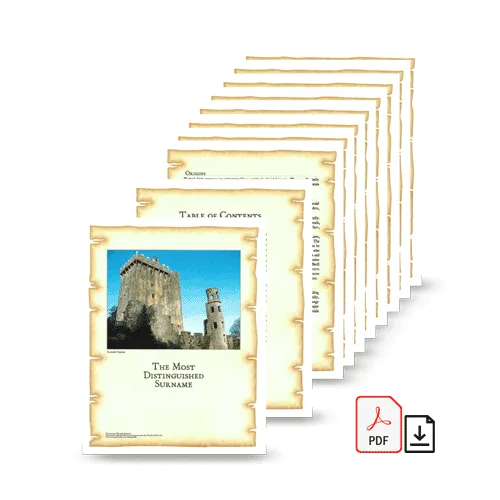| ![Show Contents]() Glassen Surname History Glassen Surname History
Etymology of GlassenWhat does the name Glassen mean? Gaelic is at the heart of many of the Irish surnames that can be found throughout the world today. The original Gaelic form of the name Glassen is Mac Glasain or Mac Glaisin; both are derived from the word "glas," which means "green" or "gray-green." Early Origins of the Glassen familyThe surname Glassen was first found in County Clare (Irish: An Clár) located on the west coast of Ireland in the province of Munster, where they held a family seat from ancient times. McGlashen stones known as "stones of strength", or "testing stones" were used for centuries as tests of strength of young men in Scotland. Traditionally known as "clach cuid fir", or "manhood stones," young men were welcomed into manhood when he was able to lift the "clach cuid fir" from the ground to waist height. More recently McGlashen Stones and the Dinnie Stones have been used in many Strongman competitions since the 1980s. In Scotland, the name is from the "Gaelic M'Glaisein, a diminutive form of M'Ghille ghlals 'son of the grey lad.' [Other early records include] Mulmory M'Glassen in the Black Isle, 1500. Iain McGalssan or McGlassane was witness at Ardgartene, 1515. John M'Glassan witnessed an instrument of sasine in 1519, as also did Cristin M'Gillecallum M'Glassen in 1525, and Paul M'Glassen is in record in Lochalsh in 1548." 1 Indeed, Scotland became the home to many of the family as today most claim to be Scottish. Early History of the Glassen familyThis web page shows only a small excerpt of our Glassen research. Another 167 words (12 lines of text) covering the years 1515, 1548, 1647, 1681, 1710, 1740 and 1797 are included under the topic Early Glassen History in all our PDF Extended History products and printed products wherever possible. Glassen Spelling VariationsBecause early scribes and church officials often spelled names as they sounded, a person could have many various spellings of his name.Many different spelling variations of the surname Glassen were found in the archives researched. These included MacGlashan, MacGlashen, MacGlasheen, MacGlassan, MacGlasson, Houneen, O'Houneen and many more. Early Notables of the Glassen familyMore information is included under the topic Early Glassen Notables in all our PDF Extended History products and printed products wherever possible.
| Glassen migration to the United States | + |
In the 18th and 19th centuries, thousands of Irish families fled an Ireland that was forcibly held through by England through its imperialistic policies. A large portion of these families crossed the Atlantic to the shores of North America. The fate of these families depended on when they immigrated and the political allegiances they showed after they arrived. Settlers that arrived before the American War of Independence may have moved north to Canada at the war's conclusion as United Empire Loyalists. Such Loyalists were granted land along the St. Lawrence River and the Niagara Peninsula. Those that fought for the revolution occasionally gained the land that the fleeing Loyalist vacated. After this period, free land and an agrarian lifestyle were not so easy to come by in the East. So when seemingly innumerable Irish immigrants arrived during the Great Potato Famine of the late 1840s, free land for all was out of the question. These settlers were instead put to work building railroads, coal mines, bridges, and canals. Whenever they came, Irish settlers made an inestimable contribution to the building of the New World. Early North American immigration records have revealed a number of people bearing the Irish name Glassen or a variant listed above, including:
Glassen Settlers in United States in the 19th Century- Fridolin Glassen, who landed in St Clair County, Illinois in 1862 2
- Victor Glassen, who landed in St Clair County, Illinois in 1864 2
- Black, George F., The Surnames of Scotland Their Origin, Meaning and History. New York: New York Public Library, 1946. Print. (ISBN 0-87104-172-3)
- Filby, P. William, Meyer, Mary K., Passenger and immigration lists index : a guide to published arrival records of about 500,000 passengers who came to the United States and Canada in the seventeenth, eighteenth, and nineteenth centuries. 1982-1985 Cumulated Supplements in Four Volumes Detroit, Mich. : Gale Research Co., 1985, Print (ISBN 0-8103-1795-8)
 |

